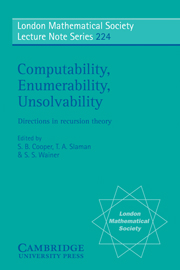Book contents
- Frontmatter
- Contents
- Preface
- Resource bounded genericity
- On isolating r.e. and isolated d-r.e. degrees
- A characterisation of the jumps of minimal degrees below 0′
- Array nonrecursive degrees and genericity
- Dynamic properties of computably enumerable sets
- Axioms for subrecursion theories
- On the ∀ ∃ - theory of the factor lattice by the major subset relation
- Degrees of generic sets
- Embeddings into the recursively enumerable degrees
- On a question of Brown and Simpson
- Relativization of structures arising from computability theory
- A Hierarchy of domains with totality, but without density
- Inductive inference of total functions
- The Medvedev lattice of degrees of difficulty
- Extension of embeddings on the recursively enumerable degrees modulo the cappable degrees
- APPENDIX: Questions in Recursion Theory
Preface
Published online by Cambridge University Press: 23 February 2010
- Frontmatter
- Contents
- Preface
- Resource bounded genericity
- On isolating r.e. and isolated d-r.e. degrees
- A characterisation of the jumps of minimal degrees below 0′
- Array nonrecursive degrees and genericity
- Dynamic properties of computably enumerable sets
- Axioms for subrecursion theories
- On the ∀ ∃ - theory of the factor lattice by the major subset relation
- Degrees of generic sets
- Embeddings into the recursively enumerable degrees
- On a question of Brown and Simpson
- Relativization of structures arising from computability theory
- A Hierarchy of domains with totality, but without density
- Inductive inference of total functions
- The Medvedev lattice of degrees of difficulty
- Extension of embeddings on the recursively enumerable degrees modulo the cappable degrees
- APPENDIX: Questions in Recursion Theory
Summary
This volume is a collection of refereed research articles commemorating the Leeds Recursion Theory Year 1993-94. The year was funded principally by the (then) UK Science and Engineering Research Council, with additional support from the London Mathematical Society, European Twinning/Human Capital and Mobility Networks on ‘Complexity, Logic and Recursion Theory’, and on ‘Proof Theory and Computation’, a MURST-British Council travel grant, an EC PECO visiting fellowship, and with the backing of the Leeds University Department of Pure Mathematics. We thank them all for enabling an invigorating year.
It is fifteen years since the publication of the last Leeds Recursion Theory volume in this same series (LMS Lecture Notes 45). In that time the subject has made great strides. New methods have been developed and out of the immense technical machinery have finally emerged solutions to long-standing problems which originally motivated the pioneers some forty years ago, notably on definability, decidability and automorphisms for recursion theoretic structures. In addition the fundamental ideas concerning computation and recursion have naturally found their place at the interface between logic and theoretical computer science, and the feedback continues to motivate mathematical research in a variety of new directions. Thus the following contributions provide a picture of current ideas and methods in the ongoing investigations of the structure of the computable and non-computable universe. A number of the articles contain introductory and background material, which it is hoped will make the volume an invaluable source of information for specialist and non-specialist alike.
- Type
- Chapter
- Information
- Computability, Enumerability, UnsolvabilityDirections in Recursion Theory, pp. vii - viiiPublisher: Cambridge University PressPrint publication year: 1996



